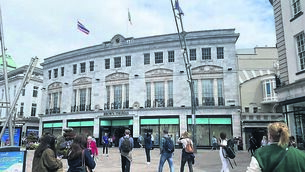More than half of us struggle... we need a wealth tax

A wealth tax would help those struggling to cope with rising prices, says Dr Tom O’Connor
People are getting more worried about food price increases. A recent PWC report indicated 71% of us are concerned about it. National conversations in homes, pubs, clubs, and the media indicate this worry about food prices is not going away.
This exposes two issues which need solutions - alleged price gouging by supermarkets, and the fact that in a deeply unequal Irish society, over half of people are permanently either barely coping financially or not at all.
The main political focus to date has been on whether the supermarkets are ripping us off. The Central Bank reports general inflation in Ireland is running at 1.6% per annum, having fallen rapidly from 4.9% about 18 months ago. Yet food inflation, according to last month’s figures, is running at 4.3% per annum.
Quickly re-capping on the level of food price increases in the year to June: a pound of butter has risen 28%, a kilo of roast beef by 20%, and a kilo of lamb by 19%, while two litres of milk rose by 27 cent and a kilo of cheese by 95 cent.
The government is not taking this seriously at all, and is comforted by the Competition and Consumer Protection Commission (CCPC) which last year found no evidence of price gouging. Supermarkets have been believed in their defence that its price rises are justified due to rising costs of production.
However, while cost pressures still do exist, they could not explain away the dramatic increases in food prices.
It’s well known that the CCPC did not have the powers to compel supermarkets to supply them with detailed data on their price structures and profit margins for the 2023 report. It still doesn’t have these powers.
Yet, the government has ordered another report from CCPC, with no new powers.
Government inaction displays lack of concern for people trying to make ends meet. This is further evidenced by its clear indication that no cost of living supports are coming in the budget. A cynic might argue the current and previous governments have form here, allowing a housing and homelessness crisis to grow for the past 20 years.
If the CCPC had the power to compel robust pricing and profits data from the supermarkets right now, it might come up with a different conclusion. The resulting outcry from that may well lead to cheaper goods.
But there is a second issue, which is more permanent and deep-seated. The fact is that over half of Irish people are living on the edge of a financial precipice at any given time, even though they are all working. Yet, people can see that a significant proportion of Irish people are exceptionally rich.
These observations are borne out by a Central Bank report in May on Household Wealth, which acknowledged that overall household wealth had risen in Ireland from 2020-2024, but that “the wealthiest 10% of Irish households owned €648.9bn, or 49.1% of total household net wealth in the country. This is more than five times the amount held by households in the bottom half of the net wealth distribution altogether (€115.1bn, or 8.7%)”.
The government will argue incomes (not wealth) have risen reasonably well in recent years. Taking the year to March, the CSO reported that average weekly earnings are up 5.6%, to €1,026 per week, for the first them since their series began.
While growth in incomes is clear, the mean average is inflated by growth in the very high incomes, which disproportionately inflates the average. A median measure, correcting this inflationary problem, reported this median or ‘middle’ value middle, where 50% of Irish earners earn below and 50% above, was €43,231 per annum. This is likely to have risen to about €47,000 in 2025, while the mean average, based on the €1,026 weekly earnings, equates to €53,000 per annum. But, just like food prices, a big weekly expenditure in this ‘booming’ economy, the other big weekly expenditures have also become more expensive, including rents, private health insurance, child care, fuel prices, housing maintenance costs.
But it is the wealth of households that shows who are truly struggling. If you are in the bottom 50% of wealth holders, you will likely be coping or struggling financially and worried about food prices, while those at the top will be partying.
This is borne out by the Central Bank Household Wealth report in May: Loans represented 30% of the total household wealth in the bottom 50% of households. Most wealth is just their home, accounting for 75% of it. Loans averaged just 8% among the wealthiest 30% of households. The home accounted for just 42% of the wealth of the top 10%, with the balance held as business wealth, deposits and other financial assets. Other financial assets are 3% of the wealth held by the bottom 50%.
Those at in the bottom 50% of wealth holders, despite some growth in their income, don’t have significant wealth to cushion them. Given they are by far the highest borrowers, as per the Central Bank report, they are likely to be the biggest share of the significant increase in borrowing last year. The Banking and Payments Federation reported a record high of €2.5 billion increase in personal loans in 2024, up a whopping 22% in a year.
Overall, then, it is abundantly clear over half of Irish people are struggling with food prices and other financial commitments too.
The government needs to take action via the CCPC on food prices, not ignore people. It needs to introduce cost of living packages in the Budget. Plans for a national living wage, due to be ‘phased in’ by 2026 need to be expedited.
A wealth tax on Irish billionaires, and those holding more than €4 million net wealth, at 1.5% would deliver the exchequer in excess of €4.7 billion in a year. This could then be targeted at those working hard, keeping the boom alive, but desperately struggling financially, along with food prices.







 App?
App?




